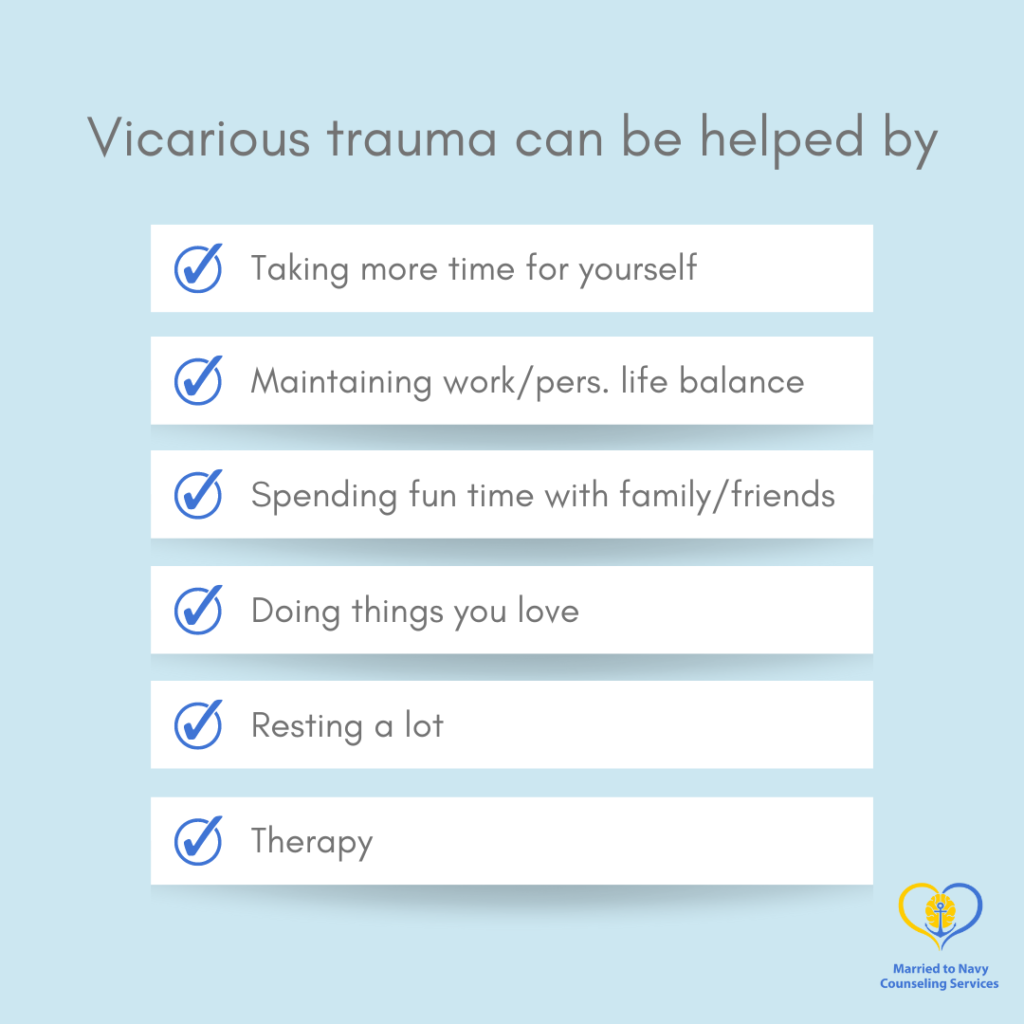Most of us have heard of trauma or PTSD (Post Traumatic Stress Disorder), and those words evoke a variety of responses from people. Some may think, “ …it’s that crazy thing really messed up soldiers get who go to war.” Another person thinks, “Isn’t that what happens to survivors of plane crashes?” Yet another may state, “There is no such thing, people just use that to get out of taking responsibility.
Well, trauma is real but this Blog is not going to address trauma. c The definition of Vicarious Trauma, according to the American Counseling Association, 2016 is: The emotional residue of exposure to traumatic stories and experiences of others’ work; witnessing fear, pain, and terror that others have experienced; a preoccupation with horrific stories told to the professional.
We hear about PTSD occurring in Military combatants, and many of us see the men and women who have provided selflessly of themselves when our nation needed them to serve. They willingly went overseas. What many people do not see or realize is the effect this can have on the wives, children, brothers, sisters, and parents who stayed home. It is not just the person serving in the military that is making a sacrifice for each one of us, but it extends to their significant others, wives, husbands, children other close family members who are impacted by long-term and or Multiple Deployments. So, let me take you on a little journey.
You are preparing to not see the person you love for 8-18 months, not always sure when you will be able to have telecommunications either email or telephone. Making sure all the bills are organized, Will’s up to date, legal issues are settled and now there is nothing to worry about because…
Everything at home has been left for you to manage; while your significant other has gone off to a location, of which you cannot be informed, to fight an enemy combatant. By the way, this includes your three children ages 3 years, 5 years, and 8 years old. Each responds differently to their parent being gone. The 3-year-old has regressed and no longer using the potty and child care is threatening to expel her due to no longer being potty trained and there are no openings at the Child Center on Base. The oldest is attempting to take over the role of the deployed parent and has begun being bossy and attempting to discipline the younger two. The other is getting in trouble at school and has increased whining at home due to needing the missing attention and not having the verbal skills to communicate their fears and how much they miss their deployed parent. All the while you continue to work full time, ensure homework is done, find out what that noise the car started making is, make dinner, and make sure you make it to soccer games, gymnastics, and doctors’ appointments.
The oldest is fearful their parent may not come home, the middle child won’t sleep in their own bed, and experiencing behavior issues at school. The youngest is no longer toilet trained and has tantrums on and off throughout the day. Going into the third week of deployment status you tell yourself you can handle this, just a few hiccups.
Family meetings set a few guidelines hoping to make things a little more routine. Things are not great but they are slowly adjusting to something a little more tolerable. Everyone’s less tense than in the beginning but the absence of “Dad” is noticeable. A few months have gone by, and several meltdowns later, teacher’s meetings due to behavior with one, another one’s grades slacking and increase in moodiness and less motivation. One teacher understood, and the other teacher feels disciplining a five-year-old who is missing their daddy is the best approach. You fall in the middle and want to scream; the child is talking too much you are trying to deal with it.

Eight months and finally, everyone has gotten into a flow of deployment. Now it is time to plan for the homecoming date. Re-integration, plans for the big day. But you decide not to tell the kids, just in case it is delayed.
Surprised the date has arrived with no delays! You get private time to meet your spouse and then get the kids from school. Everyone is excited!! Some readjustment of “Dad” being home has to occur with everyone’s roles being re-established. It’s going well… at first.
You have noticed your husband not sleeping over the first couple of weeks. The children and you have noticed he has started pacing and becoming irritated more easily than in the past. He has started going for drives which he had not done before.
He tells you he is readjusting to the time zone and being back, and finally, he yells at you to quit asking him. You think you need to be supportive and it will just be a little time for him to readjust. He has gotten quieter and does not engage with the children.
You convince him to attend one of their sporting events, and he becomes extremely irritated and goes and sits in the car. You do not understand why he bothered saying he would come and then he sits in the car for 90% of the game. You are upset and concerned that your child sees their father is not watching their game.
On the way home the child asks why he did not watch their game. Their father breaks down into tears, stating that they all deserve better than him and that he is no good to any of them. Now all the children are crying, it is up to you to console everyone. At home, you say you would like to talk with your husband. You ask what is wrong and are told nothing. Your husband leaves.
You feel sick to your stomach, you need to tend to your children. Your husband returns, he tries to apologize and the child refuses to talk. This pattern of behavior escalates until you and your spouse are arguing. He tries to sleep and he wakes up screaming. While at home he is anxious and irritable. He does not seem like he can tolerate the children fussing as children do. He expresses his guilt to you. He decides to go for help at the VA. There is a 3-month wait, and the two of you look for alternative help.
During this time he begins to tell you little pieces of what is going through his mind. Things he saw, friends he lost, and how he lost them. The fear he had was that he would not see his family again. The guilt he experiences being alive when others did not make it. The guilt he has putting his family through what he is dealing with. You comfort him all the while wondering how you can manage this, wanting to help but not knowing how.
You become increasingly worried that he is not getting the help he needs and that the children are being exposed to vacillating emotions. You start to step in to protect them from… you wonder what you are protecting them from and realize you need to get your entire family’s support. You realize you are not able to concentrate as well as you had been. You have begun having trouble sleeping waiting for your husband’s nightmare to wake you so you can help him calm down.
Having to calm the kids and tell them that it is just going to take a while for daddy to readjust. Then hiding in the bathroom to cry alone.
Then you wonder if he will go on a night drive to calm down. In the back of your mind, you know you will then have to get the kids ready for school and get yourself to work. Going through the motions at work, waiting for a call from the school because of a child falling apart, or from your spouse apologizing for struggling again. Just to go home to start homework and deal with all of this all over again.
Sad over what the love of your life has had to go through, what you are now going through, the effect this is having on your children, Finding you are feeling angry at the man you love and want him to be fixed. But don’t know what to do.
This is Vicarious Trauma, this is something that you can get help with.
List of things that will let you know it is time to get help:
- Constantly thinking about the person struggling or the situation
- Underlying feelings of frustration, anger, rage, or sadness about the person’s experiences
- Acute emotional sensitivity
- Overly with personal experience
- Feelings of hopelessness increased cynicism
- Detachment, distancing, increasing time being busy, avoiding a person with trauma
Experiencing any of these could indicate Vicarious Trauma. I encourage you to use some strategies to decrease symptoms or risk.
Strategies to decrease symptoms of Vicarious Trauma:
- Become more self-observant and document signs of stress
- Attend to your physical and mental health
- Nurture yourself, including relaxing and self-care activities
- Schedule breaks throughout your day (these can be 3 min breathing or stretching breaks)
- Plan pleasant calming family activities
- Schedule therapy if it is needed
- Maintain realistic demands on yourself and family members
- Develop a support system or use one you have
You need to focus on self-care first. If things have gotten to this point you would benefit from a therapist to help start setting boundaries and identify coping skills for each person.

As a spouse, it is important not to overextend yourself to compensate for the service members’ traumatic stress responses. Getting yourself healthy can lead to increasing all family members increased health and adjustment. Life can return to something you enjoy!
~ Jennifer E. Matilla, M.S., LMHC-QS, LPC
To make an appointment with your therapist click here.
Sources of information
American Counseling Association, (2016)
Gams, K., (2017) “Family Functioning and Secondary Traumatic Stress in Military Families: A Qualitative Study.”
Stevanovic, A., (2007), “Secondary Traumatization of Wives of War Veterans with Posttraumatic Stress Disorder, Dept of Psychiatry Psychological Medicine Section, Rijeka University School of Medicine, Rijeka, Croatia Croat Med J;48(2): 177-184
Vogel, B., 7/22/2020, “Vicarious Trauma is Real …and Really, Really Common with Lawyers.”



Trackbacks/Pingbacks